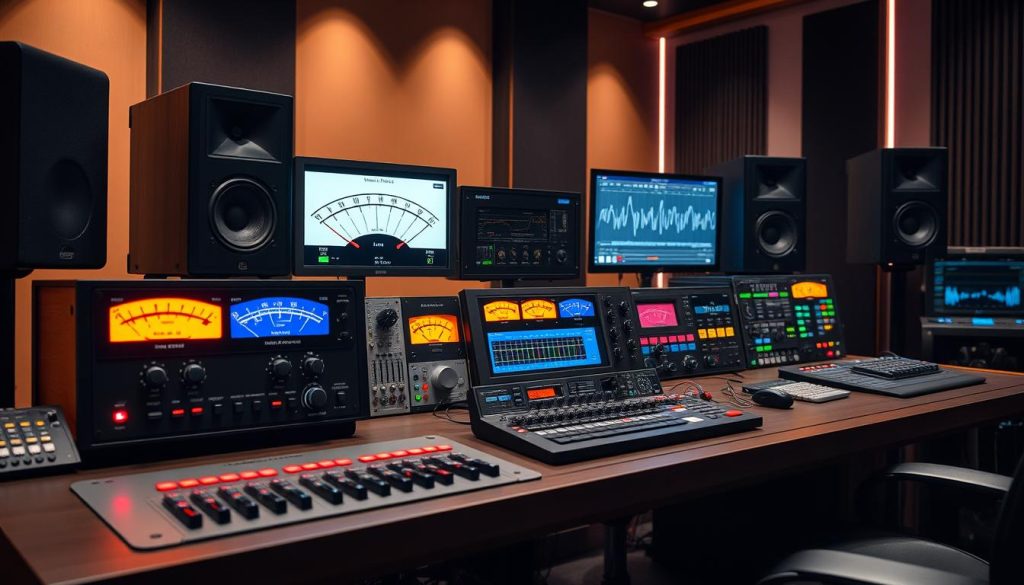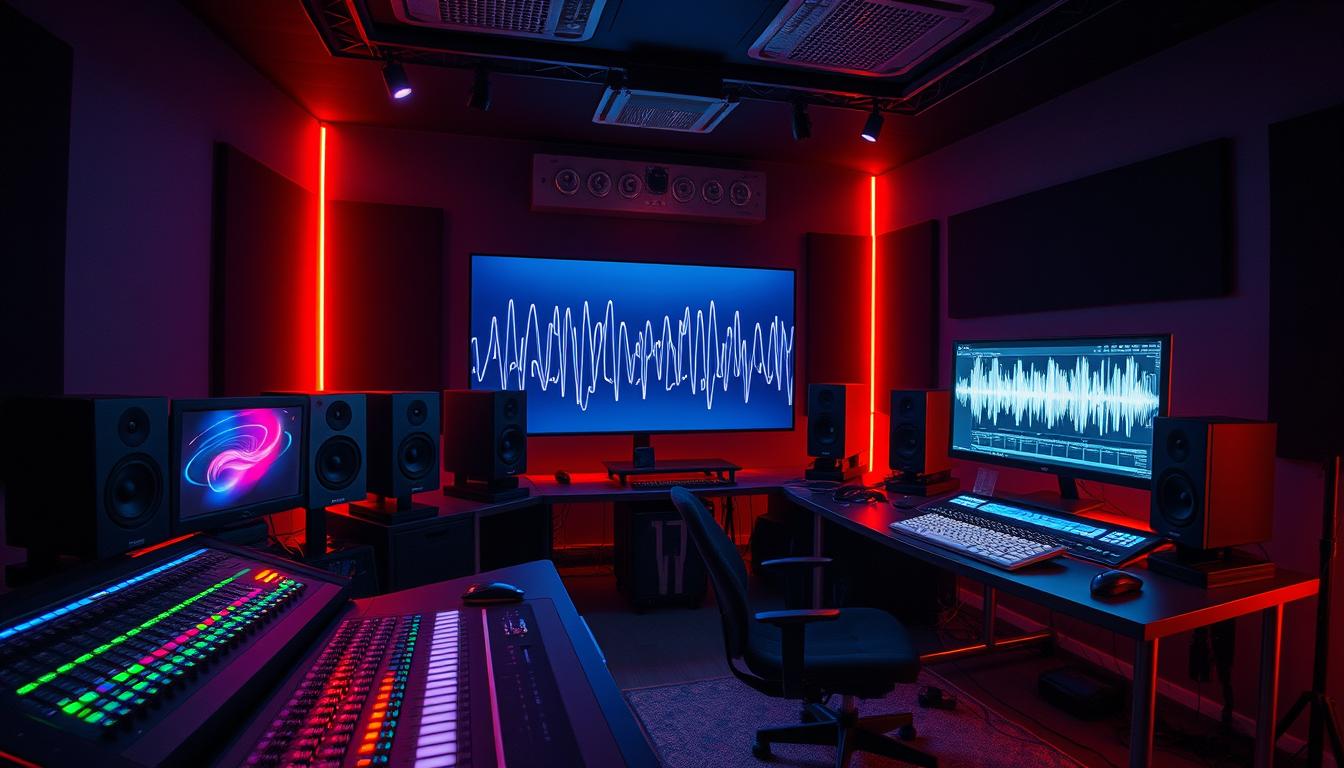As a sound engineer, I’ve learned how key mastering is in audio production. It’s the last step that makes a track sound professional. Many musicians and engineers don’t know how important mastering is.
In this article, I’ll give you tips on mastering audio. I’ll show you how to make your music sound professional. You’ll learn about loudness normalization and important metering tools.
This guide is for both new and experienced sound engineers. It will help you improve your mastering skills. Let’s explore sound engineering together. We’ll see how paying attention to details can change your music.
The Importance of Audio Mastering
The audio mastering process is key at the end of making music. As a mastering engineer, I make the music sound better before it comes out. I work on making the sound loud, adjusting it, and making sure it sounds good on all devices.
Understanding the Role of a Mastering Engineer
Some might not know how important mastering engineers are. But we’re crucial in making music sound professional. We check the mix one last time and make small changes to make it sound great.
Enhancing the Overall Mix’s Sound
I make the music sound its best through mastering. This means making it sound clear, balanced, and ready for the public. I do things like:
- Adjusting the loudness and dynamics for a strong sound
- Using EQ to make instruments and vocals clear
- Compressing the mix to fix loud parts
- Checking the mix sounds good on all devices
As a mastering engineer, I’m key in making music sound amazing. I make sure a track is ready for everyone to hear.
Loudness Normalization and Target Levels
As a sound mastering engineer, knowing about loudness normalization and target levels is key. Today, streaming services like YouTube, Spotify, and Apple Music are big. Mastering tracks with the right loudness levels is very important.
When mastering for digital distribution, think about the target loudness level. Aim for -12 to -16 LUFS (Loudness Units relative to Full Scale). This matches the loudness standards of many streaming platforms. It makes sure your music sounds good with theirs.
To get the right loudness, watch your meters during mastering. Look at the integrated loudness and the short-term loudness. This helps you keep your master in the right range. It makes sure your music sounds balanced all the time.
It’s important to know the target loudness for where your music will be played. This is true for streaming, downloads, or physical releases. Understanding loudness normalization helps you make music that grabs your audience’s attention.
Essential Metering Tools for Mastering

As a mastering engineer, I need the right tools to make tracks sound great. I use LUFS meters, frequency spectrum analyzers, and loudness history graphs. These tools help me understand the technical side of audio.
LUFS Meters for Integrated and Short-Term Loudness
LUFS (Loudness Units Full Scale) meters are key for checking loudness. They help me make sure my tracks sound good everywhere, from streaming to TV.
Frequency Spectrum Analyzers and Loudness History Graphs
Frequency spectrum analyzers show me the mix’s frequency levels. This helps me spot areas needing EQ. Loudness history graphs show the track’s dynamic range. Together, they give me a full view of the audio.
I use these tools to make sure music sounds perfect. LUFS meters, frequency analyzers, and loudness graphs help me make great decisions. This makes the final product better and pleases listeners.
sound engineering tips: Compression, EQ, and Limiting

As a mastering engineer, I’ve learned that using audio compression, EQ, and peak limiting is key. These tools help make your music sound great. They are often all you need to improve your mixes.
It’s best to use EQ before compression. This way, you can adjust the sound first, then even out the levels. Some people like to try different orders, so feel free to experiment.
Tools like stereo-width processing and spectral shaping can add extra touches. But, compression, EQ, and limiting are the main tools you’ll use. Remember, mastering should enhance your mix, not change it a lot. Use these tools carefully and gently.
Compression: Taming Dynamics
- Apply audio compression techniques to even out the levels and add sustain to your tracks.
- Experiment with different compression ratios, attack, and release settings to find the perfect balance.
- Use parallel compression to blend the compressed and uncompressed signals for a more natural, punchy sound.
EQ: Sculpting the Frequency Spectrum
- Use EQ for mastering to shape the overall tonal balance of your mix.
- Identify and address any problem frequencies that need taming.
- Enhance the clarity and definition of your mix by boosting or cutting specific frequency ranges.
Limiting: Maximizing Loudness
Peak limiting is key for making your mix as loud as possible without distortion. Try different limiter settings to get the right mix of loudness and transient preservation.
Mastering is all about finding the right balance. By using these sound engineering techniques wisely, you can make your mixes sound professional and polished.
Developing Skills as a Mastering Engineer
To be a top mastering engineer, you need many audio engineering skills. You must know how to use compressors, limiters, and noise gates well. It’s also key to know when to use them. As I get more experience, I’ll learn when to break the usual rules to get the best sound.
Being humble and open to feedback is crucial for mastering engineers. We must be ready to fix any problems from earlier stages. Getting better at this comes from learning, practicing, and working with others. Taking classes, going to workshops, and working with experts helps a lot.
I’m looking forward to improving my skills and learning new mastering techniques. I aim to give great results to the artists and producers I work with. With a commitment to learning and a focus on my craft, I’m sure I’ll become a well-known mastering engineer in the music world.

